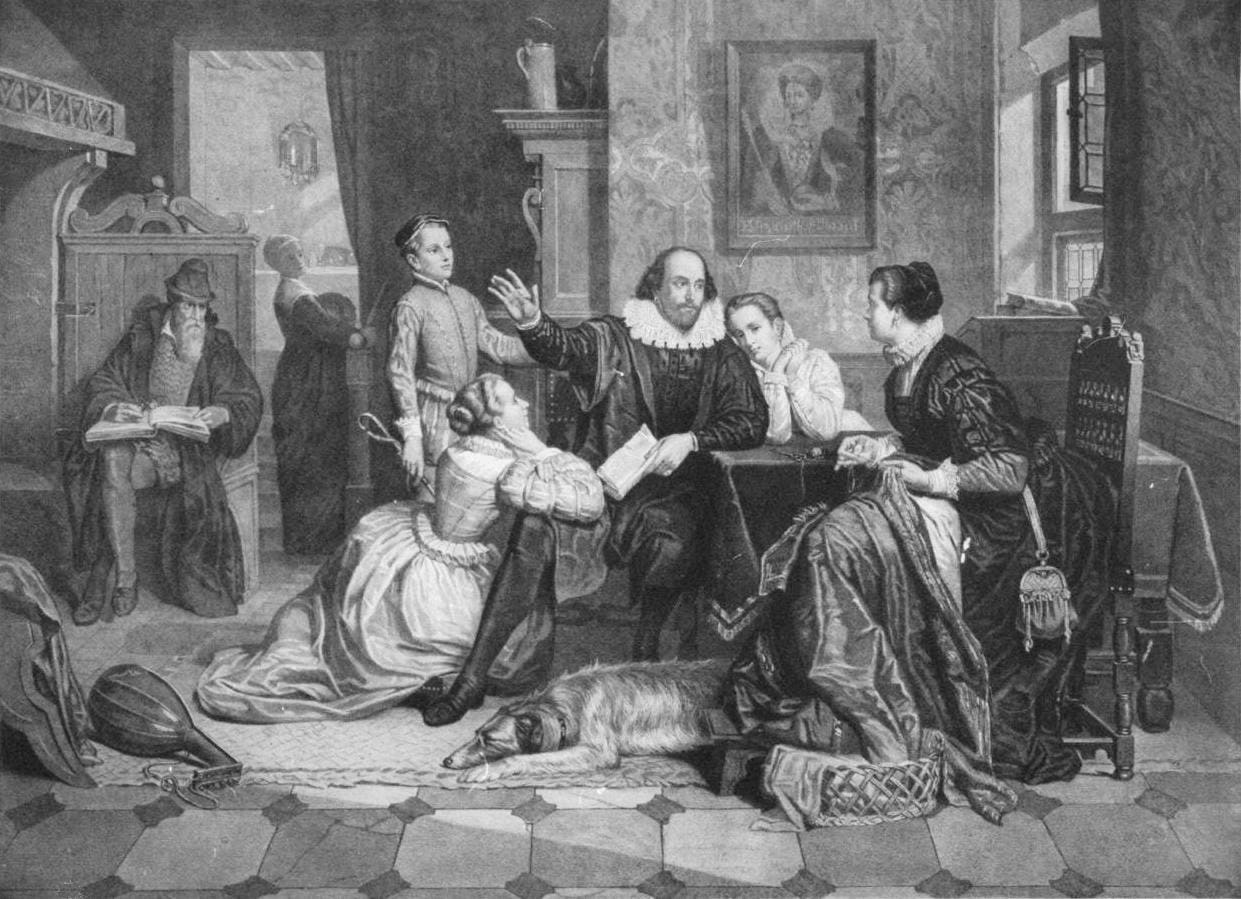Shakespeare's Life
Origins
Shakespeare was baptised on April 23, 1564, but the exact date of his birth is unknown, as he lived over 400 years ago and some of the records have been lost. He lived in Stratford - upon - Avon, a beautiful town outside London with a river running through it.
Family
His parents, John and Mary, had two other children before him, girls, who didn't survive past infancy. After his birth, the parents had two younger sisters and three younger brothers, Shakespeare the eldest child. His father eventually became the town bailiff, and married Mary Arden. It is said that Shakespeare attended the local grammar school, which taught many skills with a heavy emphasis on Latin.
Relationships
Shakespeare married Anne Hathaway at the age of 18, Anne a woman from a nearby town. She spent the rest of her life in Stratford after the marriage. They had 3 children, Susanna, Judith and Hamnet, who Anne cared for whilst Shakespeare went to London to work as a playwright. Hamnet died at the age of 11, due to . Both Judith and Susanna married, Susanna bearing a daughter. The family subsequently died out, leaving no direct descendants of Shakespeare.
 We know little about Shakespeare's romantic life beyond his marriage to Anne, but some have speculated his homosexuality. Some argue that, because Shakespeare's sonnets are autobiographical, they are evidently addressed to a young man. Furthermore, it can be said that Shakespeare was a man that explored such a theme subtly in some of his plays, such as The Merchant of Venice. In this play, there is a strong, loving and suggestively homoerotic relationship between Bassanio and Antonio, two Venetians. Additionally, Shakespeare wrote the play Othello about a man alienated from society due to his skin colour, subject to racism; perhaps this could reflect his own 'alienation' were he a gay man in a time of homophobia.
We know little about Shakespeare's romantic life beyond his marriage to Anne, but some have speculated his homosexuality. Some argue that, because Shakespeare's sonnets are autobiographical, they are evidently addressed to a young man. Furthermore, it can be said that Shakespeare was a man that explored such a theme subtly in some of his plays, such as The Merchant of Venice. In this play, there is a strong, loving and suggestively homoerotic relationship between Bassanio and Antonio, two Venetians. Additionally, Shakespeare wrote the play Othello about a man alienated from society due to his skin colour, subject to racism; perhaps this could reflect his own 'alienation' were he a gay man in a time of homophobia. The world he lived in
Shakespeare lived in a world where there was little scientific knowledge and a nation with strong superstitious beliefs that influenced their daily lives. Shakespeare wrote his plays angled at the upper-classes, yet people of all social classes came together to watch them, showing that theatre transcended the strong class divide he lived amongst.
The world he lived in was ravaged with disease, particularly in London where he worked. In 1593 and 1594, theatres were closed due to the plague. In this period, he wrote poetry of an erotic nature, and later published a now famous book of Sonnets in 1609.
He also lived in a patriarchal society dominated by men, where women were owned by their fathers and then their husbands. Despite Shakespeare writing plays that were heavily dominated by great female characters, women were never allowed on stage to play them.
Questions surrounding his work
(picture is of Zoe Wanamaker as Emilia in Othello)
She says:
'Let husbands know
Their wives have sense like them. They see, and smell,
And have their palates both for sweet and sour
As husbands have.'
Despite his exploration of bolder themes, some question his earlier play, The Taming of the Shrew, a play that depicts the gradual 'taming' of a woman, originally outspoken and headstrong, who is reduced to loving her husband (who she's forced to marry). At the time, the submission of the woman would have been widely seen as normal and perhaps even humorous, but I find it difficult to enjoy watching and to grasp as a feminist in 2017. I saw a production of it recently at The Globe, marketed towards children even younger than me. I was surprised that, out of all the plays he's written, they chose one with a storyline that is shocking in this day and age. I felt that the play tried to present too many things at once - the set was a wedding cake, there were dolls on stage, there was music, they used Brechtian techniques. They didn't clearly enough present the play with a feminist retelling, and depicted some glamorised scenes of sexual assault. One minute, there would be laughter at a comedic joke, the next the play plummeted into a dark theme, leaving me conflicted as an audience member. I found it harrowing to watch a black woman be bound to a white, powerful man with a rope, making me think of slavery. To see her being deprived of food, sleep, enjoyment, at his leisure. They injected the play with random bursts into song that felt awkward. Of course, the play was marketed to a younger audience, but I was not satisfied with the outcome.
Overall, I think that Shakespeare's plays offer so much to us in our generation. His words, penned over 400 years ago, still are so powerful and relevant to our lives. His characters are rounded, multi-faceted, and we can perform his plays in modern and old settings, and embrace and challenge what he explores.


No comments:
Post a Comment